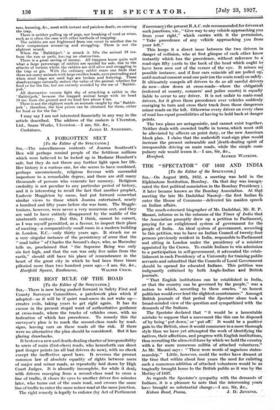THE "SPECTATOR" OF 1852 AND INDIA
[To the Editor of the SPECTATOR.] Sm,—On August 20th, 1852, a meeting was held in the Elphinstone Institution, Bombay. On that day was inaugu- rated the first political association in the Bombay Presidency ; it later became known as the Bombay Association. At that meeting the late Mr. Dadabhai Naoroji—the first Indian enter the House of Commons—delivered his maiden speech on Indian affairs.
The much-esteemed biographer of Mr. Dadabhai, Mr. R. P. Masani, informs us in the columns of the Times of India that the Association promptly drew up a petition to Parliament praying for an enlightened system of government for the people of India. An ideal system of government, aceordin to this petition, was to have an Indian Council of persons previously resident in India, responsible to Parliament and sitting in London under the presidency of a minister appointed by the Crown. To enable Indians to win admission to a participation in self-government, it advocated the estab- lishment in each Presidency of a University for training public servants and submitted that the Councils of Local Government should be opened for educated Indians. This petition was indignantly criticized by both Anglo-Indian and British journals.
" That English institutions can be established in India; or that the country can be governed by the people," was a notion to which, according to these oracles, " no honest politician would ever lend the slightest countenance." Amongst British journals of that period the Spectator alone took a broad-minded view of the question and sympathized with the demands of the Indians.
The Spectator declared that " it would be a lamentable mistake to suppose that a movement like this can be disposed of by being put down,' or ' put off. It would be a positive gain to the British, since it would commence in a more thorough style than we have yet attempted the work of identifying the natives, their affections, and progress with English institutions, thus recruiting the alien civil force by which we hold the country with a far more numerous militia of attached volunteers." As-Mr. Masani says : " These were words of sagacious states- manship." Little, however, could the writer have dreamt at the time that within about four years the need for enlisting such a numerous addition of attached volunteers would be so tragically brought home to the British public as it was by the Mutiny of 1857. - As regards the Spectator's sympathy with the demands of Indians, it is a pleasure to note that the intervening years' have brought no substantial change.—I am, Sir, &c.,






















































 Previous page
Previous page